初二下册英语知识点归纳
八年级下册英语所有知识点大汇总

nit1 what' s the matter?1. It’s +形容词 + for sb. + to do sth. 做某事对某人来说是…的。
It’s important to do sth. 做某事很重要。
It’s important for me to eat a balanced diet.平衡饮食对我来说是很重要的.It’s easy to do sth. 做某事是容易的。
It’s easy for us to find out the answer.找出答案对我们来说是容易的。
2. 情态动词should的用法should是情态动词,它的基本用法是必须和其他动词一起构成谓语。
意为"应该......"。
should(应当,应该)用于所有人称,表示劝告或建议。
eg. ---I have a very bad cold. 我感冒很厉害。
---You should lie down and have a rest. 你应该躺下,多喝水。
3. maybe与may be(1)maybe是副词,译为“也许、可能”,相当于“perhaps”。
如:Maybe he can answer the question. 也许他能回答那个问题。
He maybe is from the USA, too. 他可能也来自美国。
(2)may be中的may为情态动词,译为“可能是......”。
如:He may be from the USA, too. 他可能也来自美国。
She may be our English teacher. 她可能是我们的英语老师。
4. few、a few、little、a little的区别和联系:(1)few / a few用来修饰可数名词,few表示否定意义,没有,几乎没有;a few 表示肯定意义,有几个。
例如:He has few friends here, he feels lonely. 他这里没朋友,他感觉寂寞。
初二英语下册知识点

初二英语下册知识点〔初中〕阶段是学生学习〔英语〕的最正确时间,下面是由学习啦我共享的〔〔初二〕英语〕下册学问点,希望对你有用。
初二英语下册学问点(一)1. go to...on foot=walk to...:步行去...2. Of course.=Sure.=Certainly:当然!3. take a ship:坐轮船4. a new type of :一种新型的...5. high-speed trains:高速列车6. in large numbers:大量的7. had better+动词原形:最好... 否认:had better not+动原8. in a hurry:匆忙9. make presentation:发言;演讲10. glue sth onto...:把某物粘到...上11. at the front of:在...前面(强调平面空间) in the front of强调立体空间。
12. get+形容词=be+形容词:变得...13. in the future:在将来14. send sb from one place to another place:把某人从一个地方送到另一个地方15. learn about:学习关于... think about:思索;考虑16. present sth to:向...展示某物初二英语下册学问点(二) 1. connect to:连接到...2. hear from sb:收到某人的来信3. in small groups:在小群体中4. in a short time:在短时间内5. thousands of:数以千计的hundreds of:数以百计的6. answer the phone:接电话7. right now=at once:马上;马上;如今8. take a message for sb:给某人留口信9. wait a moment:等一下10. chat on the Internet:网上聊天11. millions of:成千上万的12. get/buy sth for sb:为某人买某物13. fail to do sth:做某事失败14. feel like doing sth=want to do sth:想要做某事初二英语下册学问点(三)1.be abroad:在国外go abroad:出国2.pen pal:笔友3.travel around the world:环游世界4.four main oceans:四大洋5.give a report:作报告6.at the end=finally:最终7.keep doing sth:始终做某事8.look up:查找初二英语下册学问点(四)1. pick up:捡起2. clean up:清理3. finish doing sth:做完某事4. throw away:扔掉;乱丢5. reusable bags:可重复使用的袋子6. give prizes:颁奖7. leaking toilet:卫生间渗漏8. make into:制作成9. worry about:担忧10. try not to do:试着不要做11. make the most pollution:造成最大的污染12. make less pollution:削减污染13. the next day:第二天14. take a walk:散步15. sort into:分类成16. make out of:用...制造初二英语下册学问点(五)1、What do you think about..?(1)think about意为"考虑;就思索'。
八年级下册英语语法知识点归纳总结
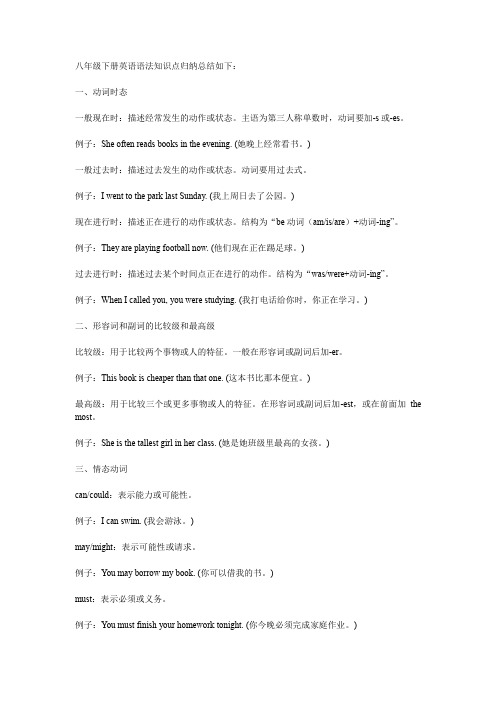
八年级下册英语语法知识点归纳总结如下:一、动词时态一般现在时:描述经常发生的动作或状态。
主语为第三人称单数时,动词要加-s或-es。
例子:She often reads books in the evening. (她晚上经常看书。
)一般过去时:描述过去发生的动作或状态。
动词要用过去式。
例子:I went to the park last Sunday. (我上周日去了公园。
)现在进行时:描述正在进行的动作或状态。
结构为“be动词(am/is/are)+动词-ing”。
例子:They are playing football now. (他们现在正在踢足球。
)过去进行时:描述过去某个时间点正在进行的动作。
结构为“was/were+动词-ing”。
例子:When I called you, you were studying. (我打电话给你时,你正在学习。
)二、形容词和副词的比较级和最高级比较级:用于比较两个事物或人的特征。
一般在形容词或副词后加-er。
例子:This book is cheaper than that one. (这本书比那本便宜。
)最高级:用于比较三个或更多事物或人的特征。
在形容词或副词后加-est,或在前面加the most。
例子:She is the tallest girl in her class. (她是她班级里最高的女孩。
)三、情态动词can/could:表示能力或可能性。
例子:I can swim. (我会游泳。
)may/might:表示可能性或请求。
例子:You may borrow my book. (你可以借我的书。
)must:表示必须或义务。
例子:You must finish your homework tonight. (你今晚必须完成家庭作业。
)四、被动语态被动语态用于描述事物的状态或描述被动发生的动作。
结构为“be动词(am/is/are/was/were)+动词的过去分词”。
八年级英语下册知识点汇总
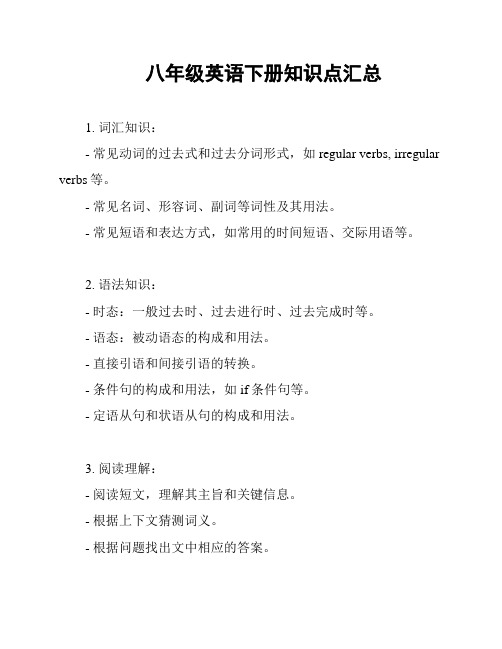
八年级英语下册知识点汇总
1. 词汇知识:
- 常见动词的过去式和过去分词形式,如regular verbs, irregular verbs等。
- 常见名词、形容词、副词等词性及其用法。
- 常见短语和表达方式,如常用的时间短语、交际用语等。
2. 语法知识:
- 时态:一般过去时、过去进行时、过去完成时等。
- 语态:被动语态的构成和用法。
- 直接引语和间接引语的转换。
- 条件句的构成和用法,如if条件句等。
- 定语从句和状语从句的构成和用法。
3. 阅读理解:
- 阅读短文,理解其主旨和关键信息。
- 根据上下文猜测词义。
- 根据问题找出文中相应的答案。
4. 写作技巧:
- 书面表达:写信、写作文等。
- 口头表达:进行简短的演讲、对话等。
- 语法和拼写的正确应用。
5. 听力技巧:
- 听取关键信息,如对话中的时间、地点、人物等。
- 根据对话内容回答问题。
- 培养对不同语速和语调的听力理解能力。
以上是八年级英语下册的主要知识点汇总,希望对你的学习有所帮助!。
初二下册英语知识点归纳

初二下册英语知识点归纳1. 时态:- 一般现在时:表示经常性的动作、习惯、真理等。
- 现在进行时:表示正在进行的动作。
- 一般过去时:表示过去的某个时间发生的动作或存在的状态。
- 过去进行时:表示过去某个时间正在进行的动作。
- 将来时:表示将要发生的动作。
2. 名词:- 可数名词:可以单独表示一个或多个的名词。
- 不可数名词:不能用于复数形式的名词,只能作为整体来看待。
- 所有格:表示所属关系的名词形式,一般在名词后面加's。
3. 形容词:- 基本形容词:用于修饰名词。
- 比较级形容词:用于表示两者之间的比较。
- 最高级形容词:用于表示三者或三者以上的比较。
4. 副词:- 修饰动词、形容词或其他副词,用于表示程度、方式、时间等。
5. 代词:- 主格代词:作主语的代词形式。
- 宾格代词:作动词或介词的宾语的代词形式。
- 形容词性物主代词:表示所属关系的代词形式。
- 名词性物主代词:作为名词的代替。
6. 数词:- 基数词:表示数量的词。
- 序数词:表示顺序的词。
7. 冠词:- 定冠词:表示特指的冠词形式,即“the”。
- 不定冠词:表示泛指的冠词形式,即“a/an”。
8. 动词:- 及物动词:需要带宾语才能完成意义的动词。
- 不及物动词:不需要带宾语就能完成意义的动词。
- 动词不定式:由“to”加动词原形构成的短语。
9. 介词:- 用于连接名词、代词或动词与其他词语的词。
10. 连词:- 表示并列关系的连词,如“and, but, or”等。
- 表示选择关系的连词,如“either…or, neither…nor”等。
- 表示因果关系的连词,如“because, so, therefore”等。
11. 疑问句:- 一般疑问句:以助动词、情态动词或be动词开头的陈述句,问句式为“助动词/情态动词/be动词+主语+谓语?”- 特殊疑问句:用特殊疑问词引导的疑问句,如“what, when, where, who, which, why, how”等。
八年级英语下册知识点总结归纳

八年级英语下册知识点总结归纳Unit 1 What’s the matter?【重点短语】1.have a fever 发烧2.have a cough 咳嗽3.have a toothache 牙疼4.talk too much 说得太多5.drink enough water 喝足够的水6.have a cold 受凉;感冒7.have a stomachache 胃疼8.have a sore back 背疼9.have a sore throat 喉咙痛10. take risks 冒险11.hot tea with honey 加蜂蜜的热茶12.see a dentist 看牙医13.get an X-ray 拍X 光片14.take one’s temperature 量体温15.put some medicine on sth. 在……上面敷药16. give up 放弃17. sound like 听起来像18. all weekend 整个周末19. in the same way 以同样的方式20. go to a doctor 看医生21. go along 沿着……走22. on the side of the road 在马路边23. shout for help 大声呼救24. without thinking twice 没有多想25. get off 下车26. have a heart problem 有心脏病27. to one’s surprise 另某人惊讶的是28. thanks to 多亏了;由于29. in time 及时30. make a decision 做出决定31. get into trouble 造成麻烦32. right away 立刻;马上33. because of 由于34. get out of 离开;从……出来35. keep on doing sth. 继续或坚持做某事36. put a bandage on sth. 用绷带包扎37. fall down 摔倒38. feel sick 感到恶心39. have a nosebleed 流鼻血40. cut his knee 割伤他的膝盖41. put her head back 把她的头向后仰42. have problems breathing 呼吸困难43. mountain climbing 登山运动44. be used to doing sth. 习惯做某事45. run out (of) 用完;用尽46. so that 以便47. so...that... 如此……以至于...…48. be in control of 掌管;管理49. in a difficult situation 在闲境中【重点句型】1. What's the matter with you?= What'the trouble with you?= What's wrong with you? 你怎么了?2. What should she do? 她该怎么办呢?3.Should I take my temperature? 我应该量一下体温吗?4.You should lie down and rest. 你应该躺下休息一会儿。
八年级下册英语一到三单元知识点

八年级下册英语一到三单元知识点那咱开始!一单元知识点。
1. 一般将来时。
- 这可是个重要的时态哦!表示将来要发生的动作或存在的状态。
常见的结构有“will + 动词原形”和“be going to + 动词原形”。
比如说,“I will go to Beijing next week.”(我下周要去北京。
)“He is going to have a party tomorrow.”(他明天要开个派对。
)- 要注意哦,will 比较随意,be going to 通常是有计划、有打算的。
2. 短语大集合。
- fall down (摔倒)想象一下,像个大冬瓜“扑通”一下倒地上。
- look for (寻找)别和 find 搞混啦,find 是“找到”,look for 是还在努力找的过程。
- in the future (在未来)未来嘛,充满了神秘和可能!二单元知识点。
1. 情态动词 could。
- could 这个小家伙,语气比 can 更委婉、更客气。
“Could you please help me?”(你能帮帮我吗?)比“Can you please help me?”听起来更有礼貌。
- 还有,could 还能是 can 的过去式,表示过去的能力。
2. 动词短语。
- cheer up (使高兴;使振奋)就像给心情打了一针兴奋剂!- give out (分发;散发)把东西一个一个发出去。
- come up with (想出;提出)脑袋里突然蹦出个好主意。
3. 感叹句。
- What + (a/an) + 形容词 + 名词 + (主语 + 谓语)!“What a beautiful flower!”(多美的花啊!)- How + 形容词/副词 + (主语 + 谓语)!像“How fast he runs!”(他跑得多快啊!)1. 过去进行时。
- 这是在讲过去某个时刻正在进行的动作。
结构是“was/were + 动词的现在分词”。
八年级下册英语知识点最全归纳

八年级下册英语知识点最全归纳Unit 1 短语及句型1.many\\much---- more + 可数或不可数名词更多few --- fewer + 可数名词更多little ----- less +不可数名词更少例如:more people、more pollution、less free time、less pollution、fewer cars、fewer trees2.there will be 将会有 There will be more people.将会有更多的人Will there be less pollution?会有更少的污染吗?Yes,there will.\\ No,there won’t.是,会有。
\\ 不,不会有。
3.be free 免费的4. on computers 在电脑上 on paper 在纸上5.live to be 活到 live to be 200 years old 活到200岁6.fall in love with sb.\\sth. 喜爱某人或某物7.live alone 单独居住8.on vacation 度假9.over and over again 一遍又一遍10.be the same as 与…一样be different from 与…不同unit 2 单词及短语1.What should I \\he\\she\\they\\you do? 我\\他\\她\\他们\\你该怎么办? You could write him a letter. 你可以给他写一封信。
2.argued with sb. 与某人争吵3.out of style 过时的 in style 时尚的4.a ticket to a ball game 一场球赛的票5.surprise sb. 使某人惊奇be surprised at sth. 对…感到惊奇to one’s surprise 令某人惊奇的事6.pay for 支付7.ask sb. for sth. 向某人要求某物ask sb. to do sth. 要求某人做某事8.have a bake sale 烧烤9.find out 发现,查明10.get on well with sb. 与某人相处得好11.have a fight with sb. 与某人争吵、打架12.not……until 直到…才13.it’s time for sth.\\it’s time to do sth. 做某事的时间到了14.under too much pressure 承受太多的压力15.take part in 参加,参与16.a mother of three 三个孩子的妈妈Unit 3 短语及句型1.What were you doing when the UFO arrived?当UFO到达时你在干什么?2.While the boy was walking down the street, the UFO landed. 当男孩在沿着街道走时,UFO降落了3.in front of 在…之前(外部整体前)in the front of (内部整体前)4.talk on the phone 在电话中交谈nd on the street 在街上降落6.walk down the street 沿着街道走7.take off (过去式 took off) 起飞8.around ten o’clock 大约10点9.You can imagine how strange it was!你可以想象它有多奇怪!10.Museum of Flight 飞行博物馆11.jump down 跳下来12.in a tree 在树上 on a tree 长在树上13.run away 跑开,逃跑14.say to sb. 对某人说15.one of the most important events 最重要的事件之一 (one of + 形容词最高级+名词复数)最…之一16.in silence 无声的17.take place 发生(预先安排) happen 发生 (偶然)18.have meaning to sb. 对…来说有意义Unit 4 短语及句型1.He said he was hard-working. 他说他努力学习了2.She said she was having a party for Lana她说她为Lana举行了聚会3.mad at sb. 对某人生气4.first of all 首先5.pass sth. to sb. \\ pass on sth. 传递某物6.be sppoused to 应该7.I’m better at reading than listening. 我的阅读比听力好。
八年级下册英语知识点

八年级下册英语知识点第一篇:八年级下册英语知识点初二(下)英语知识点总结I.重点短语1.on time 2.out of 3.all by oneself 4.lots of 5.no longer 6.get back 7.sooner or later 8.run away 9.eat up 10.take care of 11.turn off 12.turn on13.after a while 14.make faces15.teach oneself 16.fall off 17.play the piano 18.knock at 19.to one's surprise 20.look up 21.enjoy oneself 22.help yourself 23.tell a story / stories 24.leave....behind …… e along 26.hold a sports meeting 27.be neck and neck 28.as...as 29.not so / as...as 30.do one's best 31.take part in 32.a moment late 33.Bad luck!34.fall behind 35.high jump 36.long jump 37.relay race 38.well done!39.take off 40.as usual 41.a pair of 42.at once43.hurry offe to oneself 45.after a while 46.knock on 47.take care of 48.at the moment 49.set off50.here and there 51.on watch 52.look out53.take one’s placeII.重要句型1.We’d better not do sth.2.leave one.oneself3.find one’s way to a place4.stand on one’s head5.make sb.Happy6.catch up with sb.7.pass on sth.to somebody8.spend time doing sth.9.go on doing sth.10.get on well with sb.11.be angry with sb.12.be fed up with sth.13.not…until…14.make room for sb.III.交际用语1.We’re all by ourselves.2.I fell a little afraid.3.Don’t be afraid.4.Help!5.Can’t you hear anything?6.I can’t hear anything / anybody there.7.Maybe it’s a tiger.8.Let’s get it bac kbefore they eat the food.9.Did she learn all by herself? 10.Could she swim when she was …years old? 11.She didn’t hurt herself.12.He couldn’t buy himself many nice things.13.Did he enjoy himself? 14.Help yourselves.15.Bad luck!e on!17.Well done!Con gratulations(to…)!18.It must be very interesting.19.I don’t think you’ll like it.20.It seems to be an interesting book.21.I’m sure(that)… I’m not sure if… I’m not sure what to… 22.I hope so.23.What was he/she drawing when…?24.I’m sorry to trouble you.25.Would you please…? 26.What were you doing at ten o’clock yesterday morning? 27.You look tired today.28.You’d better go to bed early tonight, if you can.29.How kind!30.Let’s move the bag, or it may cause an accident.31.It’s really nice of you.32.Don’t mentio n it.33.Don’t crowd around him.IV.重要语法1.不定代词/副词的运用;2.反身代词的用法;3.并列句;4.形容词和副词的比较等级;5.冠词的用法;6.动词的过去进行时;【名师讲解】 1.bring/takeBring表示“带来、拿来”,指从别处朝说话人所在或将在的地方“带来、拿来”。
初二英语下册重要知识点归纳

初二英语下册重要知识点归纳初二英语下册重要知识点归纳初二是提高英语成绩的最佳时期,这个时候将英语学好了,有利于初三的英语学习。
下面是店铺为大家整理的初二英语下册知识点,希望对大家有用!初二英语下册重要知识点归纳篇11.would like =want , would like to do sth=want to do sth . 想要做某事would like sb. to do sth .=want sb. to do sth 想要某人做某事would you like ...? 其后用some 不用any . 句子:Would you like to do sth .肯定回答:Yes ,please ./sure ,thanks ./Yes ,I’d like to./Yes ,I’d love to 否定回答:No,thanks .But…/Sorry ,I’m afraid I can’t .2.try to do sth .尽力做某事;试图做某事;设法做某事,但不一定成功.否定式:try not to do sth.try doing sth .试着做某事,看看会发生什么情况. have a try 试一试3.a bit 与a little1)两者修饰动词,形容词,副词或比较级,2)a little 可以直接修饰不可数名词,相当于a bit of4.have a try 试试看, have a look 看一看 have a headache头疼 have a rest 休息have a meeting 开会 have a good time 玩得愉快 have a fever 发烧5.lots of =a lot of 很多,大量,常用于肯定句中.既可修饰可数相当于many ,又可修饰不可数,相当于much . a lot 相当于very much ,多与动词连用,修饰形容词,副词的比较级.6.提出建议:1)Let’s do sth.让我们做…吧.2)How about /what about doing sth ?做..怎么样3)Why not do sth ?为什么不…?4)Would you like to do …?你愿意做….吗?5)Shall we do …?我们做…好吗?6)You’d better(not) do ..你最好(不)做某事.7.Thanks for sth. =Thank you for sth. 因…而感谢.后V+ing . Thanks to 幸亏,由于,归功于.8.leave a message留个口信, take/have a message for sb.给某人带个口信.9.hear from sb.=get /receive a letter from sb . 收到…的来信hear about /of 得悉,听说Hear out 听完 hear to 同意10.can’t wait to do sth .迫不及待做某事 wait for 等候…,后接等待的对象,名词或代词wait to do sth .等着做某事初二英语下册重要知识点归纳篇2交际用语1. We’re all by ourselves.2. I fell a little afraid.3. Don’t be afraid.4. Help!5. Can’t yo u hear anything?6. I can’t hear anything / anybody there.7. Maybe it’s a tiger.8. Let’s get it back before they eat the food.9. Did she learn all by herself?10. Could she swim when she was …years old?11. She didn’t hurt herself.12. He couldn’t buy himself many nice things.13. Did he enjoy himself?14. Help yourselves.15. Bad luck!16. Come on!17. Well done! Congratulations (to…)!初二英语下册重要知识点归纳篇31. How often do you exercise? 你(你们)多久锻炼一次身体?How often + 助动词do(does或did) + 主语 + do sth.? 疑问词how often是问频率(多久一次),(在这里助动词do(does或did) 是起帮助构成疑问的`作用)与一般现在时或一般过去时连用,回答一般是用表示频率的副词,如:once,twice,three times,sometimes,often,quite,often,never,every day,once a week ,twice a month , three times a month , three or four times a month 等。
八年级下册英语语法重点

八年级下册英语语法重点一、一般将来时1.基本结构:主语+ will/shall + 动词原形+ 其他。
2.用法:表示将来要发生的动作或状态。
常与表示将来的时间状语连用,如tomorrow, next week, next year等。
3.注意事项:在否定句中,有时可以用shall not代替will not。
二、现在完成时1.基本结构:主语+ have/has + 过去分词+ 其他。
2.用法:表示过去发生的动作对现在造成的影响或结果。
常与already, just, yet等副词连用。
3.注意事项:have/has gone to表示“去某地了”,have/has been to表示“曾经去过某地”。
三、情态动词1.基本结构:情态动词+ 动词原形+ 其他。
2.用法:表示说话人的语气或情态,如能、可以、应该等。
常用的情态动词有can, may, must, shall等。
3.注意事项:情态动词后接动词原形,不能接动词的-ing形式。
四、被动语态1.基本结构:主语+ be动词+ 过去分词+ 其他。
2.用法:表示主语是动作的接受者。
常与by引导的方式状语连用,如by machine, by air等。
3.注意事项:被动语态的时态变化主要通过be动词的变化来实现,不同时态的被动语态需要注意与该时态的主动语态相对应。
五、不定代词和冠词用法1.不定代词:表示泛指或不确定的代词,如some, any, other等。
some用于肯定句,any用于否定句或疑问句;other表示“其他的”。
2.冠词:表示特指或泛指的词,分为定冠词the和不定冠词a/an。
a用于辅音音素开头的单词前,an用于元音音素开头的单词前;the 表示特指或上文提到的某个名词。
3.用法:不定代词和冠词一起使用时,可以构成限定词短语,如some books, the school gate等。
限定词短语可以修饰名词,表示特指或泛指的概念。
4.注意事项:在英语中,不定代词和冠词的使用是有规则和限制的,需要根据上下文和语境来判断使用哪个代词或冠词。
八年级下册英语笔记重点归纳

八年级下册英语笔记重点归纳一、Unit 1 What's the matter?1. 重点单词。
- matter n.问题;事情。
常用搭配:What's the matter (with sb.)?(某人)怎么了?- have a cold 感冒。
类似的表达还有:have a fever(发烧),have a cough (咳嗽)等。
- stomachache n.胃痛;腹痛。
“-ache”为后缀,表示疼痛,如:headache (头痛),toothache(牙痛)。
- foot n.脚,复数形式为feet。
- lie v.躺;平躺。
lie - lay - lain。
例如:You should lie down and rest.(你应该躺下休息。
)- rest v. n.放松;休息。
如:take a rest(休息一下)。
2. 重点短语。
- take one's temperature 量体温。
例如:The nurse took my temperature.(护士给我量了体温。
)- take breaks (take a break) 休息。
We should take breaks when we are tired.(当我们累的时候应该休息。
)- get off 下车。
He got off the bus at the next stop.(他在下一站下了公共汽车。
)- to one's surprise 使……惊讶的是;出乎……的意料。
To my surprise, he passed the exam.(令我惊讶的是,他通过了考试。
)- What should I do? 我应该做什么?用于询问建议。
- You should see a dentist and get an X - ray. 你应该去看牙医并且拍个X 光片。
should为情态动词,后接动词原形,表示建议。
人教版八年级下册英语——知识点语法归纳总结
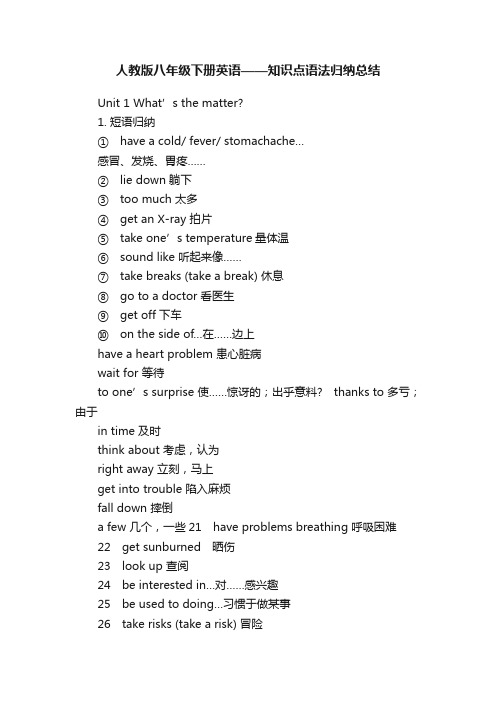
人教版八年级下册英语——知识点语法归纳总结Unit 1 What’s the matter?1. 短语归纳①have a cold/ fever/ stomachache…感冒、发烧、胃疼……②lie down 躺下③too much 太多④get an X-ray 拍片⑤take one’s temperature量体温⑥sound like 听起来像……⑦take breaks (take a break) 休息⑧go to a doctor 看医生⑨get off 下车⑩on the side of…在……边上have a heart problem 患心脏病wait for 等待to one’s surprise 使……惊讶的;出乎意料? thanks to 多亏;由于in time 及时think about 考虑,认为right away 立刻,马上get into trouble 陷入麻烦fall down 摔倒a few 几个,一些21 have problems breathing 呼吸困难22 get sunburned 晒伤23 look up 查阅24 be interested in…对……感兴趣25 be used to doing…习惯于做某事26 take risks (take a risk) 冒险27 lose one’s life 丧生28 became of 因为29 run out (of) 用尽,耗尽30 be ready to do sth. 准备做某事31 cut off 切除32 climb down 爬下33 get out of 离开;从……出来34 tell of 讲述35 the importance of (doing sth.) (做某事的)重要性36 be in control of 掌管,管理37 make a decision 做决定38 keep on doing sth. 坚持做某事39 give up 放弃40 cut/ hurt oneself 使自己受伤2. 典句必背①What’s the matter?②I have a stomachache.③What should I do?④Should I take my temperature?⑤I think you should lie down and rest.⑥If your head and neck still hurt tomorrow, then go to a doctor.⑦His love for mountain climbing is so great that he kept on climbing mountains even after this experience.3. 用法集萃(1) 当别人心情不好,身体不适或遇到麻烦时,我们可以用如下表达表示关心:What’s the matter?What’s the matter with you?What’s wrong with …?What’s the trouble\problem with …?(2) 英语中常用have描述身体的不适,此时have意为“患有”,常用结构:①have a + 疾病例:have a cold 感冒;have a fever 发烧;have a cough 咳嗽②have a + 身体部位-ache例:have a headache 头痛;have a toothache 牙痛③have a sore + 身体部位例:have a sore throat 咽喉痛;have a sore back 背痛(3) lie down躺下;tell lies/a lie 说谎含义过去式过去分词躺;平躺lay lain位于撒谎;说谎lied lied(4) maybe & may be①maybe,“或许”,常用于句首,表示可能性,后加句子。
人教版八年级下册英语知识点总结1—8单元

八下英语知识点Unit 1 What’s the matter?一、重点短语1. have a fever 发烧2. have a cough 咳嗽3. have a toothache 牙疼4. talk too much 说得太多5. drink enough water喝足够的水6. have a cold 受凉;感冒7. have a stomachache 胃疼8. have a sore back 背疼9. have a sore throat 喉咙痛10. lie down and rest 躺下来休息11. hot tea w ith honey 加蜂蜜的热茶12. see a dentist 看牙医13. get an X-ray 拍X 光片14. take one’ s temperature 量体温15. put some medicine on sth. 在……上面敷药16. feel very hot 感到很热17. sound like 听起来像18. all weekend 整个周末19. in the same way ? 以同样的方式20. go to a doctor 看医生21. go along 沿着……走22. on the side of the road 在马路边23. shout for help 大声呼救24. without th inking twice 没有多想25. get off 下车26. have a heart problem 有心脏病27. to one’ s surprise 使....... 惊讶的28. thanks to 多亏了;由于29. in time 及时30. save a life 挽救生命31. get into trouble 造成麻烦32. right away 立刻;马上33. because of 由于34. get out of 离开;从…出来35. hurt oneself 受伤36. put a bandage on sth. 用绷带包扎37. fa ll down 摔倒38. feel sick 感到恶心39. have a nosebleed 流鼻血40. cut his knee 割伤他的膝盖42. have problems breathing 呼吸困难43. mountain climbing 登山运动44. be used to doing sth. 习惯做某事45. run out (of) 用完;用尽46. so that 以便,为了47.so...that如此...以至于...48. be in control of 掌管;管理49. in a d iffic u lt situation 在闲境屮50. keep on doing sth. 继续或坚持做某事51. make a decision 做决定52. take risks 冒险53. give up 放弃二、重点句型1. What’ s the matter?你怎么了What’ s the matter with you?= What’s the trouble with you?= What’ s wrong with you?2. W hat should she do?她该怎么办呢?Should I take my temperature?我应该量一下体温吗?主语+ shoul d/shouldn’t + 动词原形.①You should lie down and rest.你应该躺下休息一会儿。
八年级英语下册知识点

八年级英语下册知识点Unit 1 what’s the matter?一、重点短语词组1. have a fever 发烧2. have a cough 咳嗽3. have a toothache 牙疼4. talk too much 说得太多5. drink enough water 喝足够的水6. have a cold 受凉;感冒7. have a stomachache 胃疼8. have a sore back 背疼9. have a sore throat 喉咙痛10. lie down and rest 躺下来休息11. hot tea with honey 加蜂蜜的热茶12. see a dentist 看牙医13. get an X-ray 拍X 光片14. take one’s temperature 量体温15. balanced diet平衡饮食16. go along…沿着……走17. take breaks 休息18. sound like 听起来像19. all weekend 整个周末20. in the same way 以同样的方式21. on the side of the road 在马路边22. shout for help 大声呼救23. without thinking twice 没有多想24. get off 下车get on 上车25. have a heart problem 有心脏病26. to one’s surprise 使.......惊讶的27. thanks to 多亏了;由于28. in time 及时29. save a life 挽救生命30. get into trouble 造成麻烦31. agree to do sth. 同意做什么32. because of 由于33. get out of 离开;从……出去34. hurt oneself 受伤35. put a bandage on sth.用绷带包扎36. fall down 摔倒37. feel sick 感到恶心38. have a nosebleed 流鼻血39. cut his knee 割伤他的膝盖40. put her head down 把她的头低下41. have problems breathing 呼吸困难42. mountain climbing 登山运动43. be used to doing sth. 习惯做某事44. take risks 冒险45. so that 为了46. So… that 如此……以至于…47. be in control of 掌管;管理48. in a difficult situation 在困境中49. keep on doing sth. 继续或坚持做某事 50. make a decision 做出决定51. stay healthy 保持健康=keep healthy=keep in good health=keep fit52. put some medicine on sth. 在…上面敷药二、重点句型1. What’s the matter?你怎么了?= What’s the trouble / problem with you?= What’s wrong with you?2. What should she do? 她该怎么办呢?Should I take my temperature? 我应该量一下体温吗?主语+ should/shouldn’t + 动词原形...①You should lie down and rest. 你应该躺下休息一会儿。
人教版初中英语八年级下册全册各单元知识点、语法归纳整理
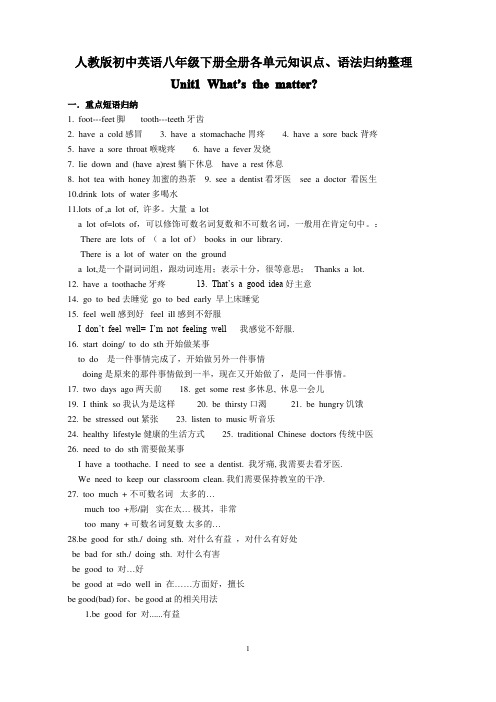
人教版初中英语八年级下册全册各单元知识点、语法归纳整理Unit1W hat’s the matter?一.重点短语归纳1.foot---feet脚tooth---teeth牙齿2.have a cold感冒3.have a stomachache胃疼4.have a sore back背疼5.have a sore throat喉咙疼6.have a fever发烧7.lie down and(have a)rest躺下休息have a rest休息8.hot tea with honey加蜜的热茶9.see a dentist看牙医see a doctor看医生10.drink lots of water多喝水11.lots of ,a lot of,许多。
大量a lota lot of=lots of,可以修饰可数名词复数和不可数名词,一般用在肯定句中。
:There are lots of(a lot of)books in our library.There is a lot of water on the grounda lot,是一个副词词组,跟动词连用;表示十分,很等意思;Thanks a lot.12.have a toothache牙疼13.That’s a good idea好主意14.go to bed去睡觉go to bed early早上床睡觉15.feel well感到好 feel ill感到不舒服I don’t feel well=I’m not feeling well我感觉不舒服.16.start doing/to do sth开始做某事to do是一件事情完成了,开始做另外一件事情doing是原来的那件事情做到一半,现在又开始做了,是同一件事情。
17.two days ago两天前18.get some rest多休息,休息一会儿19.I think so我认为是这样20.be thirsty口渴21.be hungry饥饿22.be stressed out紧张23.listen to music听音乐24.healthy lifestyle健康的生活方式25.traditional Chinese doctors传统中医26.need to do sth需要做某事I have a toothache.I need to see a dentist.我牙痛,我需要去看牙医.We need to keep our classroom clean.我们需要保持教室的干净.27.too much+不可数名词太多的…much too+形/副实在太…极其,非常too many+可数名词复数太多的…28.be good for sth./doing sth.对什么有益,对什么有好处be bad for sth./doing sth.对什么有害be good to对…好be good at=do well in在……方面好,擅长be good(bad) for、be good at的相关用法1.be good for对......有益Doing morning exercises is good for your health.做早操对你们的建康有益。
人教版八年级英语下册1-5单元知识点归纳
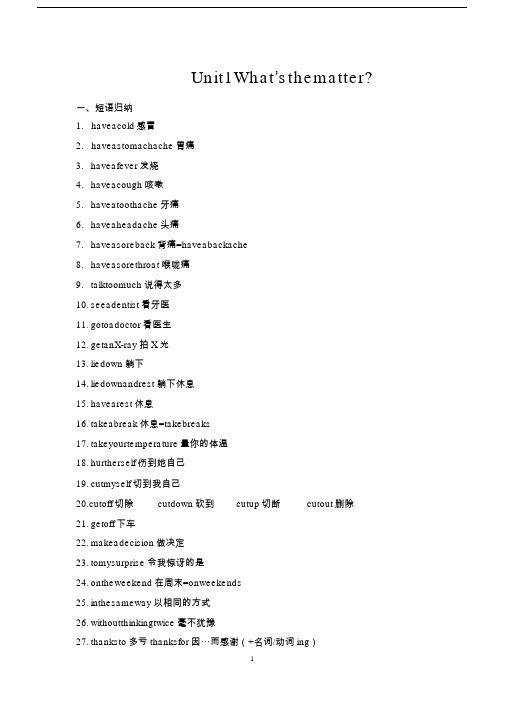
Unit1What’sthematter?一、短语归纳1.haveacold感冒2.haveastomachache胃痛3.haveafever发烧4.haveacough咳嗽5.haveatoothache牙痛6.haveaheadache头痛7.haveasoreback背痛=haveabackache8.haveasorethroat喉咙痛9.talktoomuch说得太多10.seeadentist看牙医11.gotoadoctor看医生12.getanX-ray拍X光13.liedown躺下14.liedownandrest躺下休息15.havearest休息16.takeabreak休息=takebreaks17.takeyourtemperature量你的体温18.hurtherself伤到她自己19.cutmyself切到我自己20.cutoff切除cutdown砍到cutup切断cutout删除21.getoff下车22.makeadecision做决定23.tomysurprise令我惊讶的是24.ontheweekend在周末=onweekends25.inthesameway以相同的方式26.withoutthinkingtwice毫不犹豫27.thanksto多亏thanksfor因⋯而感谢(+名词/动词ing)28.intime及时ontime按时29.savealife挽救生命30.getintotrouble陷入麻烦31.rightaway马上32.falldown跌倒33.waitfor等待34.beinterestedindoingsth.对做某事感兴趣35.giveup放弃二、用法集萃1.询问有什么病或有什么麻烦:What’sthematter(withsb.)?2.疾病的表达:have/hasa+疾病名称3.太多:toomuch+不可数名词;toomany+可数名词复数形式太:muchtoo+形容词4. enough足够的:①形容词+enough②enough+名词③itisenough+todosth.5. lie躺下过去式:lay现在分词:lying6.seesb.doingsth.看见某人正在做某事(正在进行)seesb.dosth.看见某人做了某事(看见动作的全过程)7.expecttodosth.期望做某事8.needtodosth.需要做某事9.helpsb.(to)dosth.帮助某人做某事10.tellsb.(not)todosth.告诉某人(不要)做某事11.asksb.todosth.要求某人做某事12.wanttodosth.想要做某事13.agreetodosth同.意做某事disagreetodosth.不同意做某事agreewithsb.同意某人的意见14.trouble问题;麻烦havetrouble/problemdoingsth.做某事有困难15.介词+doing常见的介词有:at;for;with;without;inabout16.be/getusedtodoingsth.习惯于做某事17.keepondoingsth.继续做某事18.minddoingtsh.介意做某事19.反身代词:myself我自己yourself你自己himself他自己herself她自己itself它自己复数:ourselves我们自己yourselves你们自己themselves他们自己20.knife-knives刀名词复数规则变化:①一般情况+s②以e结尾+s③以s、x、ch、sh结尾+es④以辅音字母+y结尾,变y为i+es⑤以o结尾,有生命+es;无生命+s⑥以f/fe结尾,变f/fe为v+es不规则变化:foot-feet脚、足tooth-teeth牙齿man-men男人woman-women女人mouse-mice老鼠21.important重要的importance重要性different不同的difference差异性22.death死亡(名词)die死(动词)dead死的(形容词)三、书面表达Howtokeephealthy如何保持健康Healthisimportant.Everyonewantstobehealthy.Letmetellyouhowtokeephealthy.Firstofall,weshouldeathealthyfood.Weshouldeatmorevegetablesandfruit.Wealson eedtodrinkmilk.Secondly,weshouldexercisealot.Weshoulddosomesportsafterschool.Finally,weshouldhaveenoughsleep.Tohaveagoodrest,weshouldgotobedearlyandgetupearly.Ithinkitisimportantforustokeephealthy.3Unit2I’llhelptocleanupthecityparks.一、短语归纳1. cleanup打扫干净cheerup使兴起来代词放中间2.giveout分发3.handout分发eupwith想出;提出(idea、plan等)5. putoff推迟puton穿衣服putup张贴putaway把⋯收好6.callup打电话;征召edtodosth.曾经做某事beusedtodingsth习.惯于做某事8. lonely孤独的(常用于feel之后)alone独自一人9.carefor照顾=takecareof10.afeelingofsatisfaction一种满足感11.tryout参加⋯选拔12.raisemoney募捐13.fixup修理14.giveaway赠送(money、oldclothes/books等)giveup放弃15.takeafter(外貌或行为)像16.besimilarto与⋯相似17.setup建立18.makeadifference影响;有作用19.disabledpeople残疾人20.makeaplan制定计划21.oldpeople’shome养老院22.helpoutwithsth.帮助解决困难23.abooklover书迷24.attheageof在⋯岁时etrue实现(与dream连用)26.atthesametime同时27.homelesspeople无家可归的人28.beworriedabout为⋯而担心worryabout担心29.forexample例如30.runoutof用完31.not⋯anymore不再32.atonce立刻;马上=rightaway二、用法集萃1.volunteertodosth自愿做某事2. difficult困难的difficulty困难havedifficulty(in)doingsth.做某事有困难3.excited兴奋的(人作主语)exciting使人兴奋的(物作主语)口诀:人+ed物+ing4.疑问词(how,what,where)+todo5. decidetodosth.决定做某事名词形式:decision makeadecision做决定6.learntodosth.学习做某事7.agoodwaytodosth.做某事的好方法8.wouldliketodosth.=wanttodosth.想要做某事9.thankyouforsth./doingsth.因某事/做某事而感谢10.kind善良的kindness善意Unit3Couldyoupleasecleanyourroom?一、短语归纳1.dothedishes清洗餐具2.takeouttherubbish倒垃圾3.foldtheclothes叠衣服foldmy/your/hisclothes4.sweepthefloor扫地5.makethebed铺床makemy/your/hisbed6.cleanthelivingroom打扫客厅7.helpoutwithsth.帮助解决某事8.atleast至少eover过来;顺便来访10.infrontof在⋯前面11.takethedogforawalk遛狗12.allthetime一直13.assoonas一⋯就⋯14.insurprise惊讶地15.hangout闲逛16.dochores做家务17.awasteoftime浪费时间18.inorderto为了19.getgoodgrades取得好成绩20.dependon依靠21.takecareof=carefor=lookafter照顾22.asaresult结果23.fallill生病二、用法集萃1.finishdoingsth.完成做某事2.if如果(主将从现,if后为从句,用一般现在时);是否(位于动词之后)3.assoonas一⋯就⋯.主将从现,assoonas后为从句4.replyangrily生气地回答(副词修饰动词,一般位于动词之后)abeautifuldog一只漂亮的狗(形容词修饰,名词,位于名词前)口诀:形名动副5.beangrywithsb.生某人的气6.as+形容词原级+as和⋯一样7.neitherdidI我也没有neither+be动词/助动词(do/does/did)/情态动词+主语“主语也不⋯..”so+be动词/助动词(do/does/did)/情态动词+主语“主语也⋯”8.can-could可以can,could还可以表示请求,could比can更有礼貌肯定回答:Sure./Ofcourse./Noproblem./Yes,sure.否定回答:No,youcan’t./Sorry,Ican’t.9.asksb.todosth.要求某人做某事10.borrow⋯from⋯跟⋯借(借进来)lend⋯to⋯把⋯借给⋯.(借出去)11.invitesb.todosth.邀请某人做某事12.helpwithsth.helpsb.(to)dotsh.帮助做某事13.havetimetodosth.有时间做某事havenotimetodosth没.时间做某事14.letsb.dosth.让某人做某事15.makesb.dosth.让某人做某事16.spend花费人+spend+时间+onsth/doingsth在某事上花时间/花时间做某事cost花费物+cost+金钱$某物花了多少钱take(took)花费Ittakes/tooksb.+时间+todo.做某事花了某人多少时间payfor付费17.itis+adj(forsb.)+todosth.做某事对某人而言是⋯的18.fair公平的unfair不公平的fairness公平性19.doone’spartindoingsth.尽自己的职责做某事20.the+比较级,the+比较级越...越⋯比较级and比较级越⋯越⋯theearlier⋯thebetter越早越好betterandbetter越来越好Unit4Whydon’tyoutalktoyourparents?一、短语归纳1.talkto/withsb.与某人交谈talkaboutsth.谈论某事2.freetime空闲时间3.allowab.todosth.允许某人做某事allowdoingsth.允许做某事4.hangout闲逛5.getintoafight争吵;打架6.sothat为了;以便于7.lookthrough浏览;快速查看8.workout成功地发展;解决9.getonwith/getalongwith和睦相处municatewithsb.与某人交谈11.abigdeal重要的事petewithsb.与某人竞争13.examskills应试技巧14.cutout删除pare⋯with⋯比较16.not..until直到⋯才17.arguewithsb.与某人争吵18.noproblem没问题19.not..anymore不再20.inmyopinion依我看21.thanksfor因⋯而感谢22.allkindsof各种各样的23.worryabout为⋯而担心=beworriedabout二、用法集萃1.提建议句型:①Youshould/shouldn’t dosth.②How/Whataboutdoingsth.?③Whydon’tyoudosth.?④Whynotdosth.?⑤Shallwedosth.?⑥Let’sdosth.⑦You’dbetterdosth.⑧Wouldyouminddoingsth.?常见回答:Goodidea./Soundsinteresting./I’dliketo./Great.否定:I’dloveto,butIhaveto⋯/Sorry,Ican’t.2.beangrywithsb.生某人的气3. although/though虽然不与but连用4.advice建议(不可数名词)5.refusetodosth.拒绝做某事6.instead代替;反而(位于句首或句尾)insteadof代替(位于句中)7.offertohelp提供帮助8.minddoingsth.介意做某事9.continuetodo/doingath.继续做某事10.keepondoingsth.继续做某事11.afew一些(肯定)few一点点(否定)修饰可数名词复数形式alittle一些(肯定)little一点点(否定)修饰不可数名词做题步骤:先看横线后的名词,判断可数还是不可数;其次,理解句子表达的肯定还是否定12.it’s timeforsth.该做某事了=it’stimetodosth.pete竞争(动词)competition竞争(名词)14.havetimetodosth有.时间做某事Unit5Whatwereyoudoingwhentherainstormcame?一、短语归纳1.gooff闹钟发出响声2.rainheavily下大雨3.pickup接电话;采摘4.atfirst起先5.fallasleep进入梦乡6.diedown逐渐变弱7.havealook看一看8.makeone’sway费力地前进9.insilence沉默10.takedown拆除;往下拽;记录11.atthetimeof⋯当⋯.的时候12.waitfor等待13.atthattime在那时(一般过去时标志词)14.wakeup醒来15.goshopping去购物16.takeashower洗澡17.inamess乱七八糟18.forexample例如19.makesure确保二、用法集萃1.过去进行时定义:表示在过去某一时刻或某一时间段正在进行的动作。
八年级下册英语知识点总结

八年级下册英语知识点总结英语是一门广泛使用的语言,在全球范围内都有重要的地位。
作为一名八年级学生,学习英语是非常关键的。
下面将为大家总结八年级下册英语的重点知识点。
一、语法知识1. 直接引语和间接引语:直接引语是直接引用他人的原话,需使用引号标记;间接引语是将他人原话进行转述。
2. 时态:掌握一般现在时、一般过去时、一般将来时、现在进行时、过去进行时、现在完成时的基本用法和区别。
3. 被动语态:了解如何使用被动语态,即将主动语态句子中的主语变为动作的承受者,动词通过be动词词组和过去分词构成。
4. 宾语从句:了解宾语从句的构建规则,即将一个完整的句子作为宾语嵌入到主句中。
5. 并列连词:掌握如and、but、or等并列连词的使用,能够使用它们连接句子和短语。
二、词汇知识1. 同义词和反义词:学会辨别和使用同义词和反义词,能够丰富写作和口语中的表达。
2. 前缀和后缀:了解常见的前缀和后缀,可以通过改变单词的结构和含义,扩展词汇量。
3. 习惯用语和短语:学会使用一些习惯用语和短语,能够让你的英语更加地道和流利。
4. 近义词和辨析:掌握一些近义词和辨析词,能够在写作和阅读中正确使用它们。
三、句子结构和写作技巧1. 各种从句:了解各种从句的构建规则,如定语从句、主语从句、表语从句和状语从句,能够在写作中使用。
2. 书信写作:学会书写不同类型的书信,包括邀请信、道歉信、建议信等,了解书信的格式和常用句式。
3. 描述和说明:学会使用一些常用的描述性和说明性的句式,可以更清晰地表达自己的观点和观察。
四、阅读理解技巧1. 主旨大意题:通过阅读文段,掌握提取主旨和大意的技巧,能够准确回答相关问题。
2. 细节理解题:学会寻找文段中的细节,能够迅速找到相关信息并回答问题。
3. 推理判断题:理解文段的背景和内容,能够根据已有信息进行推理和判断。
4. 根据上下文猜测词义:通过上下文的提示和线索,能够猜测单词或短语的意义。
- 1、下载文档前请自行甄别文档内容的完整性,平台不提供额外的编辑、内容补充、找答案等附加服务。
- 2、"仅部分预览"的文档,不可在线预览部分如存在完整性等问题,可反馈申请退款(可完整预览的文档不适用该条件!)。
- 3、如文档侵犯您的权益,请联系客服反馈,我们会尽快为您处理(人工客服工作时间:9:00-18:30)。
初二下册英语知识点归纳1. foot---feet脚<复>tooth---teeth牙齿<复>2. have a cold感冒3. have a stomachache胃疼4. have a sore back背疼5. have a sore throat喉咙疼6. have a fever发烧7. lie down and (have a)rest躺下休息have a rest休息8. hot tea with honey加蜜的热茶9. see a dentist看牙医see a doctor看医生10.drink lots of water多喝水11.lots of ,a lot of,a lota lot of=lots of,可以修饰可数名词复数和不可数名词,大凡用在肯定句中。
:There are lots of ( a lot of) books in our library.There is a lot of water on the grounda lot,是一个副词词组,跟动词连用;表示十分,很等意思;Thanks a lot.12. have a toothache牙疼13. That’s a good idea好主意14. go to bed去睡觉go to bed early早上床睡觉15. feel well感到好feel ill感到不惬心I don’t feel well= I’m not feeling well我感觉不惬心.16. start doing/ to do sth开始做某事TO DO是一件事情完成了,开始做另外一件事情DOING是原来的那件事情做到一半,现在又开始做了,是同一件事情。
17. two days ago两天前18. get some rest多休息,休息一会儿19. I think so我认为是这样20. be thirsty口渴21. be hungry饥饿22. be stressed out吃紧23. listen to music听音乐24. healthy lifestyle康健的生活方式25. traditional Chinese doctors传统中医26.need to do sth需要做某事I have a toothache. I need to see a dentist.我牙痛,我需要去看牙医.We need to keep our classroom clean.我们需要保持教室的明净.27. a balance of yin and yang阴阳平均28. for example例如29. too much yin太多的阴,阴气太盛too much +不可数名词太多的…much too +形/副实在太…极其,非常too many +可数名词复数太多的…30.be good for sth./ doing sth.对什么有益,对什么有好处be bad for sth./ doing sth.对什么无益be good to对…好be good at =do well in在……方面好,擅长be good(bad) for、be good at的相关用法1.be good for对......有益Doing morning exercises is good for your health.做早操对你们的建康有益。
2.be good at擅长于......Li Ping is good at basketball.李平擅长于篮球。
= Li Ping is good at playing basketball.李平擅长于打篮球。
be good at = do well in如:I“m good at math. = I do well in math.我擅长于数学。
3.be good to对......好Parents are always good to their children.父母亲总是对他们的孩子好。
31.get good grades取得好成绩32.angry用法be angry with sb生某人的气Iwasangrywithhimforkeepingmewaiting.我对他很生气,因为他让我等了好久。
be angry at/ about sth就某事生气33.Chinese medicine中药34.be popular in + some place在某地很流行Chinesemedicineisnowpopularinmanywesterncountries.现在中药在许多西方国家受欢迎。
35.in western countries在西方国家36.It’seasytodosth做某事是简易的。
It’simportanttodo sth .做某事很严重。
37.balanced diet平均饮食38.get tired感到疲顿be/get tired39.go out at night在晚上出去When you are tired, you shouldn’t go out at night. 疲顿时,晚上你不该外出40.stayhealthy保持康健=keephealthy=keepingoodhealth41.at the moment此时,此刻= nowI’m not feeling very well at the moment42.enjoy sth. =like sth. (名词)喜欢某物,enjoy doing sth.喜欢做某事=like dong sthenjoy oneself (myself, yourself,herself, himself,themselves, ourselves, itself反身代词)玩得高兴,过得欢愉=have a good time = have awonderful time=have fun43. conversation practice会话练习44. host family寄宿家庭45. have a lot of headaches经常疼痛I’m tired and I have a lot of headaches. 我很困乏,而且经常头痛。
46. a few +可数名词复数少许…a little +不可数名词/形/副一点…47.He shouldn’t eat anything=He should eat nothing.他不应当吃任何东西.48.give sb some advice给某人建议give advice提出建议advice是不可数名词a piece of advice一则建议take one’s advice 采纳或听从某人的建议He gave me some good advice.他向我提了一些很好的意见。
49.sleep 8 hours a night每晚睡眠八小时50.take medicine吃药服药I have to take medicine three times a day for my cold.因为感冒,我不得不一天吃三次药。
【篇二:不变结构】It’s +形+ for sb. + to do sth.做某事对某人来说是…的。
It’s important to do sth .做某事很严重。
It’s important for me to eat a balanced diet. 平均饮食对我来说是很严重的.It’s easy to do sth做某事是简易的。
It’s easy for us to find out the answer.找出答案对我们来说是简易的【篇三:重点句子】1.What’s the matter ? What’s the mater with you ? 你怎么啦?=What’s the trouble with you?=What’s wrong with you?I have a cold / have a sore back / have a stomachache2.That’s too bad. You should / shouldn’t …那太倒霉了.你应该/不该…You shouldliedownandrest/drinkhotteawithhoney/seeadentist/ see a doctor .He shouldn’t eat anything = He should eat nothing. 他不应当吃任何东西.3.I’m not felling well . 这里well表示身体状况,不能用good代替I don’t feel well= I’m not fee ling well 我感觉不惬心.4.When did it start ? About two days ago .什么时候开始的?大约两天前5.I hope you fell better soon .我希望你很快好起来这里better是well的比较级6.TraditionalChinesedoctorsbelieveweneedabalanceofyin and yang to be healthy.传统中医认为我们需要阴阳调和以保持身体康健。
这里to be healthy是动词不定式短语,作目的状语7.You should eat hot yang foods, like beef.你应该吃一些像牛肉之类的阳性食物。
8.Eating Dangshen and Huangqi herbs is also good for this.吃党参和黄芪等草本植物也对这有好处。
9.Peoplewhoaretoostressedoutandangrymayhavetoomuchyang.太吃紧易怒的人或许吃了太多的阳性食物。
toomuch后跟不可数名词,而too many后跟可数名词复数10.I t’s easy to have a healthy lifestyle ,and it’simportanttoeatabalanceddiet.有一个康健的生活方式很简易,饮食平均是很严重的。
→ It’s easy to do sth . 做某事简易/ It’s important todo sth .做某事严重11.You should rest for a few nights.你应该休息几个晚上12.I study late every night, sometimes until 2 am, but Idon’t think I’m improving.我每天晚上学到很晚,有时到凌晨2点钟,但我认为我没有提高。
